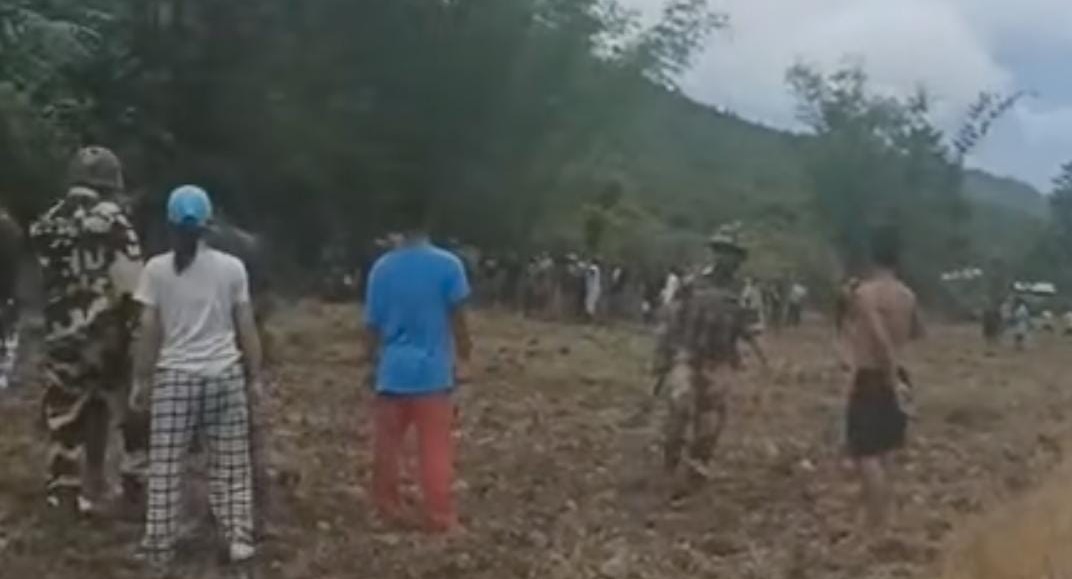
Tensions flared this morning at approximately 10:30 AM in the sensitive buffer zone between the Kuki-Zo dominated Wakan area and Meitei-dominated Leitanpokpi, as an attempt to plough land in a disputed area sparked confrontation between local communities.
A Meitei farmer from Leitanpokpi reportedly drove a tractor into a paddy field located in Sadu Lampak village, dangerously close to Kuki-Zo settlements. Members of the nearby Kuki-Zo community intervened and objected to the activity, asserting that the land in question does not belong to the farmer, and that farming in such contested zones is a serious provocation and security threat.
Soon after, more individuals from the Meitei side arrived, and unverified videos began circulating online suggesting that the Kuki-Zo community was disrupting peaceful farming. However, these portrayals ignore the critical context of the situation and unfairly vilify the Kuki-Zo villagers, who acted to defend both territorial integrity and communal safety.
Security forces, including the Additional SP of Imphal East and central paramilitary units, were already present at the scene, maintaining order. Additional reinforcements led by the Superintendent of Police have also responded, underscoring the seriousness of the situation.
The Kuki-Zo community reiterates that any unilateral agricultural activity in buffer zones is not only irresponsible but highly provocative. Given the fragile state of inter-community relations, such actions risk triggering violent clashes and must be strongly discouraged.
“This is not about obstructing livelihoods,” a local Kuki-Zo elder stated. “It is about maintaining peace and respecting boundaries until a lasting resolution is achieved. Farming in disputed or sensitive areas—especially without prior consultation—is reckless.”
The Kuki-Zo community calls on both civil authorities and peacekeeping forces to remain vigilant and act decisively against any activity that could destabilize the region. All communities must refrain from using agriculture as a pretext to assert territorial claims, especially when tensions remain high and demarcations are yet to be finalized.
In light of the recent confrontation over land use in the buffer zone between Kuki-Zo and Meitei settlements, serious legal questions are now being raised about the legitimacy of land claims made by Meitei residents of Leitanpokpi.
According to Lenin Haokip, Legal Affairs Secretary of the Kuki Inpi Manipur (KIM), the land in question—claimed by individuals from Leitanpokpi—falls within the jurisdiction of Purum Likli village, located in Saikul Sub-Division, Sadar Hills East, under the Kangpokpi District. This region is a notified Hill Area governed by the provisions of the Manipur (Hill Areas) District Council Act.
Under the Manipur Land Revenue and Land Reforms Act, 1960, specifically Section 2 and Section 158(a)(b):
Furthermore, Section 28 of the Registration Act, 1908, mandates that land documents must be registered with the Sub-Registrar Office in the district where the land is located. Any land transaction registered outside this jurisdiction is considered invalid and illegal.
Against this legal backdrop, the Kuki Inpi Manipur has posed a set of pressing, unanswered questions to the Government of Manipur and the people of Leitanpokpi:
Until these critical questions are addressed with transparent legal documentation, any attempts to plough, farm, or occupy land in the disputed area must be viewed as illegitimate, unlawful, and a direct provocation in violation of established legal protections for tribal lands.
"Respect for land laws is non-negotiable, especially in Hill Areas where the law clearly restricts non-tribal encroachment. The burden of proof lies with those claiming ownership," said Lenin Haokip.
Kuki Inpi Manipur has called upon the state government, civil society, and responsible media to uphold constitutional safeguards and avoid one-sided narratives that overlook the legal and historical realities of land ownership in tribal areas.
The need of the hour is caution, dialogue, and respect—not provocation under the guise of farming, Kuki Inpi said.

The Hills Journal
K. Salbung, Churachandpur
Manipur-795128